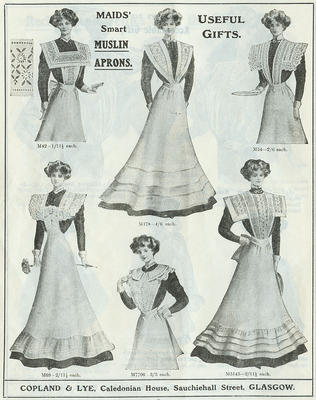
What the well dressed maid was wearing in 1909, as illustrated in Copland & Lye's Christmas gifts catalogue. The quality of maids' uniforms would be seen as an indication of the status of the household. It is likely that these uniforms were made in Glasgow, as the manufacture of muslin goods was an important trade in the East End where a number of thriving firms operated in the textile industry.
While boys traditionally sought an apprenticeship in one of Glasgow's industries on leaving school, many girls chose to work as servants. In 1901 over 1.5 million people were in domestic service in Britain. Their duties were arduous but essential. With few labour-saving appliances, everything was done by hand - from laying the grate in the morning and cleaning and cooking to doing the laundry. When large numbers of men volunteered for the armed forces on the outbreak of war in 1914, tens of thousands of women found better-paid employment in factories producing armaments.
Reference: Glasgow City Archives, TD128/95
Reproduced with the permission of Glasgow City Council, Libraries Information and Learning
Keywords:
aprons, Caledonian House, Christmas presents, Christmas shopping, Copland & Lye, department stores, domestic sevants, girls, maids, muslin, textiles, trade catalogues, uniforms, women
You have 7 images in your photo album.